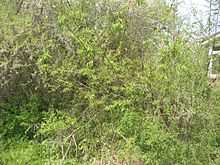Salix udensis
| Salix udensis | |
|---|---|
 | |
| Salix udensis 'Sekka' | |
| Scientific classification | |
| Kingdom: | Plantae |
| (unranked): | Angiosperms |
| (unranked): | Eudicots |
| (unranked): | Rosids |
| Order: | Malpighiales |
| Family: | Salicaceae |
| Genus: | Salix |
| Species: | S. udensis |
| Binomial name | |
| Salix udensis Trautv. & C.A.Mey. | |
Salix udensis (syn. S. sachalinensis F.Schmidt) is a species of willow native to northeastern Asia, in eastern Siberia (including Kamchatka), northeastern China, and northern Japan.[1]
It is a deciduous shrub growing to 5 m (16 ft) tall. The leaves are slender, lanceolate, 6–10 cm long and 0.8–2 cm broad, glossy dark green above, glaucous and slightly hairy below, with a serrated margin. The flowers are produced in early spring on catkins 2–3 cm long.[2]
The cultivar S. udensis 'Sekka' (Japanese fantail willow) is grown as an ornamental plant; it has fasciated stems (stems that are joined abnormally in a flattened arrangement--hence "fantail"), highly prized by Ikebana flower arrangers.[2]
References
- ↑ Germplasm Resources Information Network: Salix udensis
- ↑ 2.0 2.1 Huxley, A., ed. (1992). New RHS Dictionary of Gardening. Macmillan ISBN 0-333-47494-5.